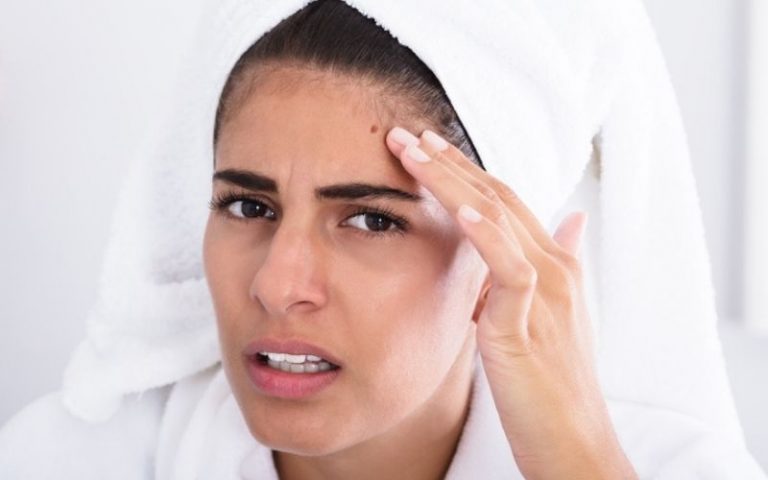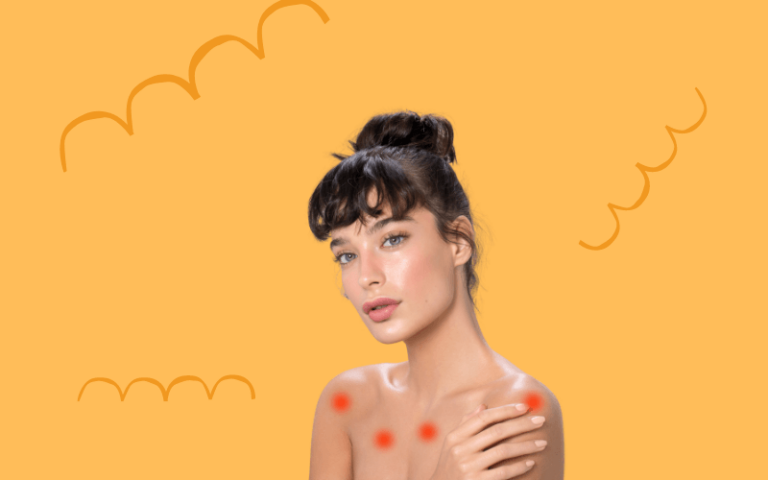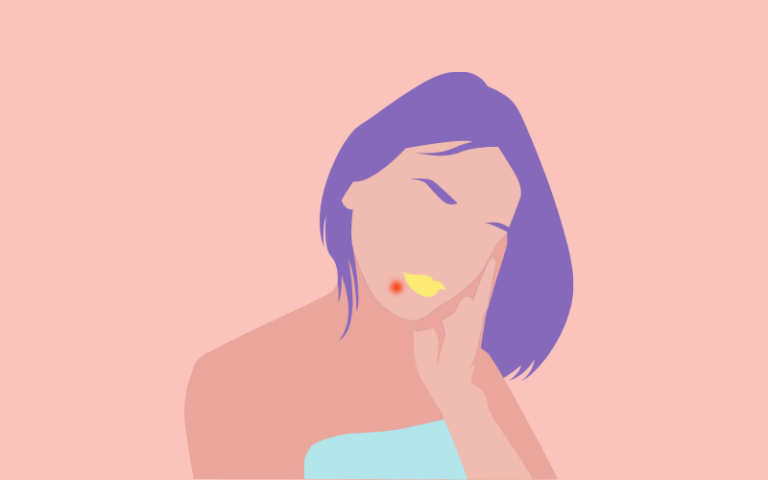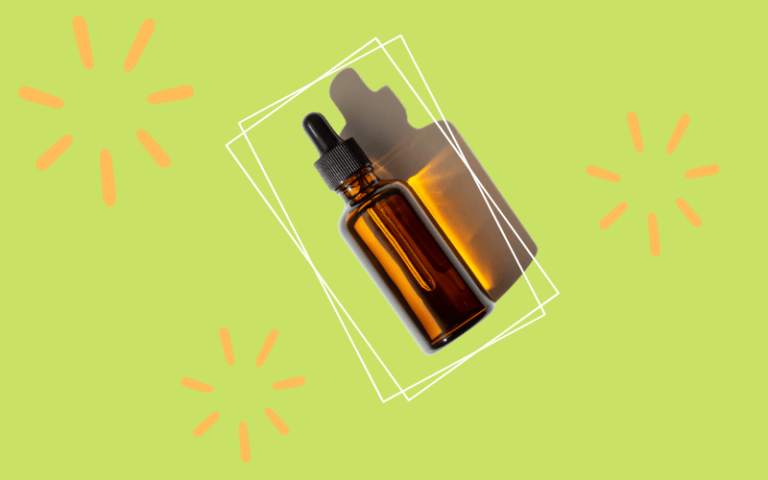7 Best Vitamins and Supplements For Acne
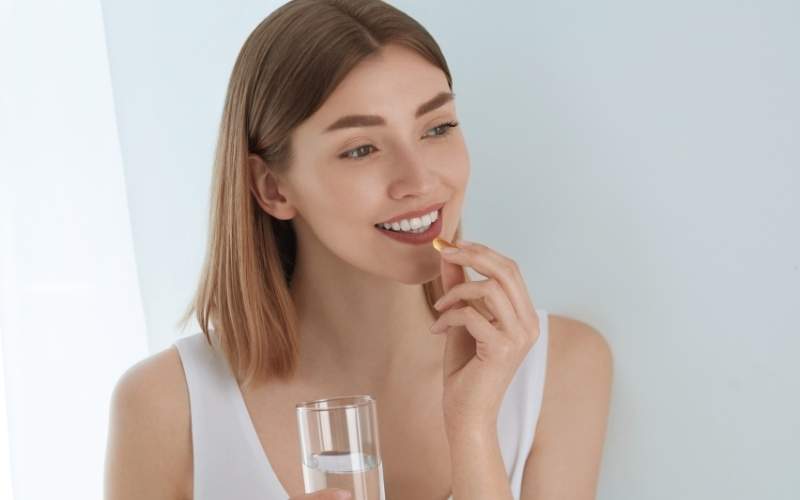
Had enough? Same. Tried all of the over-the-counter acne products? Same. Open to anything that may help give you clear skin? Same.
While topical treatments and prescription oral medications definitely play a huge role in acne, what about supplements? We’ve got some good news.
While you may be taking a multivitamin and one or more supplements for your overall health, supplements may actually be beneficial for your skin health, too!
Let’s dive into and talk about some oral supplements that may be able to help battle those breakouts on your jawline and anywhere else.
Healing from within
We’ve all likely heard that your diet can potentially affect your overall skin health. This is important since our skin is our largest organ!
We’re told to avoid dairy, sugar, and white carbs. All the fun stuff.
But we don’t really hear about what we should be ingesting to help fight acne, blackheads, or even cystic acne.
Well, that’s because there just isn’t enough research out there to support it.
That being said, many people will claim that when they “clean up” their diet, they see a reduction in the severity of their skin issues which makes sense!
While we definitely don’t have all of the answers at this point, we do know that some vitamins and nutrients can have an effect on the underlying causes of acne vulgaris, which is a good reason to give them a try.
Supplements
Let’s talk about 7 of the best supplements can minimize your vitamin deficiency and help improve your acne.
1. Zinc
Zinc is considered an essential mineral meaning our bodies need it to perform and function properly.
Our bodies do not produce zinc on their own, so we must supplement with zinc either through our diet or with oral supplements (1).
While you likely think of zinc as help for immunity during cold and flu season, it is thought to help with breakouts as well.
Zinc supplements helps increase cellular turnover in skin cells, which could be benefical with fighting clogged pores (2).
There are also studies that suggets that zinc has antibacterial and anti-inflammatory properties which could actually help decrease oil production on the skin!
2. Vitamin A
Vitamin A is a group of retnoids (yes, like the retinol/retinoid you put on your skin!).
Vitamin A, which is also found in carrots, is often thought of as being essential to help with our vision. While that is true, it may actually help with your pesky zits as well!
Vitamin A can help decrease sebum production which is obviously a good thing for acne prone patients. Be sure to consult your dermatology professional regarding dosage, before you start taking vitamin A for acne (3).
This is because high dose vitamin A can cause some pretty intense side effects such as super dry skin, rough skin, nausea, hair loss, or even birth defects if taken while pregnant.
Your dermatologist may decide to give you a prescription medication with a high dosage of vitamin A called isotretinoin, or Accutane, which is highly monitored due to its potential side effects (4).
3. Vitamin E
Vitamin E is an antioxidant that helps fight off potentially damaging free-radicals that contribute to oxidative stress which can lead to cell and tissue scar damage.
Vitamin E is well represented in a typical multivitamin but is most commonly used topically in skin care ingredients to help you achieve clearer skin, however, taking a vitamin E capsule could potentially help with acne treatment.
There are studies that showed that patients with severe acne had a lower serum level of Vitamin E than patients without severe acne so supplementing with vitamin E could potentially help with annoying pimples or skin redness.
Essentially, more research would need to be done to fully support the recommendation of incorporating this supplement into your daily routine.
4. Probiotics
Probiotics are a “healthy” bacterial supplement that help fill your gut with good bacteria. Probiotics are said to help decrease inflammation in the body.
Recently, probiotics have become more popular when it comes to working towards having healthy skin.
Probiotics can be found in foods like yogurt and other fermented foods. Many people decide to take probiotics while undergoing treatment with antibiotics to help keep their gut healthy!
Since inflammation can be highly associated with acne, it makes sense that incorporating probiotic supplements could help fight blemishes. They are thought to help with several inflammatory conditions of the skin including acne, rosacea, and even eczema (12).
Probiotics even help strengthen your immune system and keep you “regular” when it comes to your GI organs, so why not give them a try!
5. Vitamin D
Vitamin D is a vitamin that helps with bone health, reducing inflammation, and strengthing your immune system. It can be found in food, supplements, or from sunlight!
Since vitamin D is known to be anti-inflammatory (6), it is thought to help improve acne, as well!
Studies show that patients who struggle with inflammatory acne are actually found to have a lower vitamin D levels than patients who do not deal with acne breakouts (jealous!).
One study on vitamin D levels and supplication in patients with acne showed that when acne patients with a low vitamin D level supplemented with vitamin D, they experienced improvement with their acne (5). Therefore, it may be a good option to help get that you glowing complexion you’re dreaming of!
6. Fish Oil
Fish oil, or omega-3, is a healthy fat that comes from several different types of fish. Fish oil can help with heart health, brain function, eye health, inflammatory disorders, skin health, and has several other potential health benefits (7).
Some studies show that supplementing with fish oil capsules can even help improve moderate to severe acne (8).
Again, since acne lesions are inflammatory in nature, the anti-inflammatory properties of fish oil are shown to potentially help improve the skin in acne patients.
Fish oil is thought to help with other skin conditions as well such as eczema and psoriasis (9). Fatty acids, like those in omega-3 supplements, are vital for skin health but it is checking with your doctor before starting a new supplement is always the best option.
7. Magnesium
Magnesium, a mineral and natural supplement, is mainly known for its role in keeping our bones and muscles happy and healthy.
Magnesium is also known to help up your workout game, help fight depression, and help with diabetes.
So, magnesium can possibly help with my skin? Yep!
Magnesium is shown to have some anti-inflammatory benefits which, you probably know by now, can be helpful with fighting acne (10)
It is also known to potentially have an effect on hormones and may be able to help with hormonal imbalances in the body, which can be a trigger for hormonal acne in particular.
You may choose to incorporate more magnesium but increasing foods rich in the mineral into your diet, such as nuts and spinach, or you may decide to grab an oral supplement for the convenience.
Potential side effects
As always, before you ever start a new supplement or vitamin, be sure to consult with your primary care provider.
This is especially important if you take any prescription medications or have any underlying health issues in the first place.
Different vitamins and supplements could affect other medications you are taking and may even potentially make them less effective, so again, check with your doctor before starting a new supplement.
In general, you may experience upset stomach, diarrhea, nausea, or other GI symptoms when starting new supplements.
There is such as thing as taking too many vitamins or too much of one supplement in particular so always stay within the dosing guidelines per your doctor’s recommendation.
As with anything you ingest, there is always a chance of experiencing an allergic reaction. While this is rare, it is definitely a possibility, so if you experience itching, hives, shortness of breath, difficulty swallowing or any other alarming symptoms, be sure to go to the emergency department immediately.
Overall, supplements are typically a safe addition, especially after consulting with your doctor.
When in doubt, reach out!
We recommend making an appointment with your primary care doctor before incorporating any new supplements to stay on the safe side.
Honorable mentions
While these supps are our top 7 for you to try, there are also a few others that play a solid role in skin health that you should know about:
- Vitamin C: This vitamin is found in many foods but can also be supplemented. Vitamin C plays a crucial role in the biosynthesis of collagen (18) which is important for healthy skin and can aid in fading hyperpigmentation over time.
- B Vitamins: Vitamin B6, B12, and B1 are known to have a function in the health of your skin. Especially if you are vegan, supplementing B12 will be important (18).
- Calcium: Yep, it’s not just for strong bones anymore. Calcium is essential in regulating many skin functions.
- Selenium: This trace mineral helps to protect cells from damage such as free-radicals, similar to that of vitamin E (15).
- Chlorella: This algae species can come in the form of a supplement and has been shown to reduce inflammatory cells and decrease acne vulgaris (17).
Supplements to beware of
Some supplements can lead to skin issues such as acne that you should also be aware of:
- Whey protein supplements: Whey has been studied to have a negative effect on skin based on the dairy content and insulin growth factors (igf-1) (13) within the supps that may cause you to break out (16).
- Testosterone: Testosterone is known to increase sebum and play a role in the onset of acne vulgaris. If you are on a testosterone supplement, speak with your doctor about any concerns regarding your skin health and the dosage you are recieving.
Conclusion
To wrap it up, you can use supplements as a safe way to fill in the gap between the diet you have and the nutrients you need for healthy skin.
But first, be sure to consult with your doctor. When in doubt, reach out!
We recommend making an appointment with your primary care doctor before incorporating any new oral supplements into your skincare routine!
Remember, if you are considering adding supplments into your skin care routine, here are the top 7 that we recommend considering!
1. Zinc: Zinc supplements helps increase cellular turnover which could be benefical with fighting clogged pores.
2. Vitamin A: Vitamin A can help decrease sebum production which is obviously a good thing for acne prone patients.
3. Vitamin E: Supplementing with vitamin E could potentially help with annoying pimples.
4. Probiotics: Probiotics are thought to help with several inflammatory conditions of the skin including acne, rosacea, and even eczema.
5. Vitamin D: Since vitamin D is known to be anti-inflammatory, it is thought to help improve acne.
6. Fish oil: Since acne lesions are inflammatory in nature, the anti-inflammatory properties of fish oil are shown to potentially help improve the skin in acne patients.
7. Magnesium: Magnesium is shown to have some anti-inflammatory benefits which can be helpful with fighting acne.
The more you take care of your health on the inside, the more you can typically see that health shining through on the outside!
While topical treatments definitely still have a role in acne bumps, supplements may end up being a part of the formula for success on your journey to get that glow you deserve!
Sources:
- “Office of Dietary Supplements – Zinc.” NIH Office of Dietary Supplements, U.S. Department of Health and Human Services, ods.od.nih.gov/factsheets/Zinc-HealthProfessional/.
- S;, Brandt. “The Clinical Effects of Zinc as a Topical or Oral Agent on the Clinical Response and Pathophysiologic Mechanisms of Acne: a Systematic Review of the Literature.” Journal of Drugs in Dermatology : JDD, U.S. National Library of Medicine, pubmed.ncbi.nlm.nih.gov/23652948/.
- “Office of Dietary Supplements – Vitamin A.” NIH Office of Dietary Supplements, U.S. Department of Health and Human Services, ods.od.nih.gov/factsheets/VitaminA-HealthProfessional/.
- Kotori, Merita Grajqevci. “Low-Dose Vitamin ‘A’ Tablets-Treatment of Acne Vulgaris.” Medical Archives (Sarajevo, Bosnia and Herzegovina), AVICENA, D.o.o., Sarajevo, Feb. 2015, www.ncbi.nlm.nih.gov/pmc/articles/PMC4384860/.
- Lim, Seul-Ki, et al. “Comparison of Vitamin D Levels in Patients with and without Acne: A Case-Control Study Combined with a Randomized Controlled Trial.” PloS One, Public Library of Science, 25 Aug. 2016, www.ncbi.nlm.nih.gov/pmc/articles/PMC4999291/.
- “Office of Dietary Supplements – Vitamin D.” NIH Office of Dietary Supplements, U.S. Department of Health and Human Services, ods.od.nih.gov/factsheets/VitaminD-HealthProfessional/.
- Jung JY;Kwon HH;Hong JS;Yoon JY;Park MS;Jang MY;Suh DH; “Effect of Dietary Supplementation with Omega-3 Fatty Acid and Gamma-Linolenic Acid on Acne Vulgaris: a Randomised, Double-Blind, Controlled Trial.” Acta Dermato-Venereologica, U.S. National Library of Medicine, pubmed.ncbi.nlm.nih.gov/24553997/.
- Khayef, Golandam, et al. “Effects of Fish Oil Supplementation on Inflammatory Acne.” Lipids in Health and Disease, BioMed Central, 3 Dec. 2012, www.ncbi.nlm.nih.gov/pmc/articles/PMC3543297/.
- “Omega-3 Supplements: In Depth.” National Center for Complementary and Integrative Health, U.S. Department of Health and Human Services, www.nccih.nih.gov/health/omega3-supplements-in-depth.
- “Office of Dietary Supplements – Magnesium.” NIH Office of Dietary Supplements, U.S. Department of Health and Human Services, ods.od.nih.gov/factsheets/Magnesium-HealthProfessional/#h2.
- Keen, Mohammad Abid, and Iffat Hassan. “Vitamin E in Dermatology.” Indian Dermatology Online Journal, Medknow Publications & Media Pvt Ltd, 2016, www.ncbi.nlm.nih.gov/pmc/articles/PMC4976416/.
- Kober MM, Bowe WP. The effect of probiotics on immune regulation, acne, and photoaging. Int J Womens Dermatol. 2015;1(2):85-89. Published 2015 Apr 6. doi:10.1016/j.ijwd.2015.02.001
- Cengiz, Fatma Pelin, et al. “Acne Located on the Trunk, Whey Protein Supplementation: Is There Any Association?” Health Promotion Perspectives, vol. 7, no. 2, Mar. 2017, pp. 106–08. PubMed Central, doi:10.15171/hpp.2017.19.
- Ebede, Tobechi L., et al. “Hormonal Treatment of Acne in Women.” The Journal of Clinical and Aesthetic Dermatology, vol. 2, no. 12, Dec. 2009, pp. 16–22.
- Park, Kyungho. “Role of Micronutrients in Skin Health and Function.” Biomolecules & Therapeutics, vol. 23, no. 3, May 2015, pp. 207–17. PubMed Central, doi:10.4062/biomolther.2015.003.
- Pontes, Thaís de Carvalho, et al. “Incidence of Acne Vulgaris in Young Adult Users of Protein-Calorie Supplements in the City of João Pessoa – PB.” Anais Brasileiros de Dermatologia, vol. 88, no. 6, 2013, pp. 907–12. PubMed Central, doi:10.1590/abd1806-4841.20132024.
- Sibi, G. “Inhibition of Lipase and Inflammatory Mediators by Chlorella Lipid Extracts for Antiacne Treatment.” Journal of Advanced Pharmaceutical Technology & Research, vol. 6, no. 1, 2015, pp. 7–12. PubMed Central, doi:10.4103/2231-4040.150364.
- Rembe, Julian-Dario, et al. “Effects of Vitamin B Complex and Vitamin C on Human Skin Cells: Is the Perceived Effect Measurable?” Advances in Skin & Wound Care, vol. 31, no. 5, May 2018, pp. 225–33. PubMed, doi:10.1097/01.ASW.0000531351.85866.d9.

